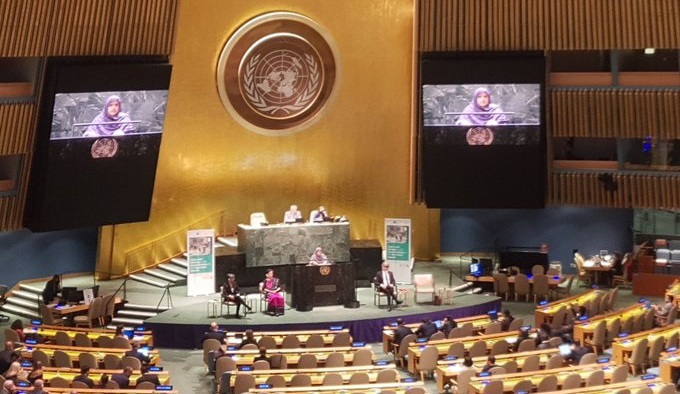However, we have observed that, despite some corrective responses, the WTO and our governments have not been able to stem the swelling tide of economic inequities that dispossess especially the most-vulnerable people in our countries. The advancement of the private market may serve private interests, but are incapable of addressing social needs. The highly ideological reliance on market mechanisms to serve the lofty goals in the WTO’s founding charter is either majestically naïve, or majestically disingenuous.
Despite the more-moderate claims of its founding charter’s preamble, the WTO’s collective ideological bias is to promote private objectives through trade and investment, where corporate interests and institutions dominate. However, to meet the priority of social needs, particularly for the most victimized and vulnerable, we still need States with competent governments that meet their human rights obligations foremost. Alas, our States and governments fail to coordinate among ministries such that the international financial institutions make commitments distinctly contradictory to the prior international public law obligations of the same States and governments to uphold their human rights commitments.
In this context, we stress that trade liberalization should be understood as a means for achieving sustainable development, and not as an end in itself. Trade policies based on national and regional priorities should be an integral part of plans to achieve the Millennium Development Goals (MDGs). Accordingly, the aim should not be to liberalize trade, but to set deliberate trade policies that do no less than secure social, economic, and cultural rights for all.
Maintaining the State
Our governments also need to consider the impact of negotiations in the nonagricultural market access (NAMA) agreement on our industrial future. Our governments should secure a tariff-reduction formula that includes the development aspects based on the specific conditions and needs of each country.
Moreover, the privatization of public goods and services, such as land and water, is not culturally appropriate to our faith-based and land-based cultures. Neither is privatization conducive to our peoples’ rights to self-determination: Privatizing common elements of human subsistence in our region typically has raised costs, deepened poverty, bred corruption, displaced social capital needed for autonomous management, depleted the natural environment, concentrated wealth and eroded the relations between local authorities and inhabitants preferably joined in commonly determining locally relevant development priorities.
This is why, basic services including education, water services, health, social protection, and energy should be excluded from trade liberalization. That exclusion is essential for human development and social justice.
The initial agreement on services, which was part of the Uruguay Round, was relatively development friendly and secured flexibilities for developing countries. According to paragraph 15 of the Doha Declaration, which highlights Articles IV and XIX of the General Agreement on Trade in Services (GATS), the basis for negotiations on services is linked to increasing participation by developing countries and negotiating specific commitments. Through this approach, there was space to protect the development policies of our countries. Our governments should stand together, and with other groups of developing countries, in rejecting the new benchmarking and mandatory plurilateral approaches in services negotiations as well as the inclusion of basic services under the negotiations.
The UNDP Human Development Report has signaled repeated warnings against the negative consequences of the Agreement on Trade-Related Aspects of Intellectual Property Rights (TRIPS), particularly on food security, indigenous knowledge, bio-safety and access to vital medicines and health care. The wave of economic and corporate restructurings undertaken in response to an increasingly competitive global market, the widespread dismantling of social security systems and decline of standards in social services all have resulted in unemployment, work insecurity, evictions and homelessness, landlessness, lost livelihoods, harm to health and worsening labor conditions. These conditions lead to violations of core economic and social rights obligations of State[2] for which our policy makers bear civil responsibility.
Public Goods: Land and Housing
People are leaving their lands out of consequent need and rallying to urban centers and lifestyles. People and their local cultural narratives are being absorbed into homogenizing cities, while urbanist policy makers and authorities often consider this wave “inevitable” and, meanwhile, curse it. By doing so, they typically blame the victims, evicting them and demolishing their modest homes where they can.
Slums and their poverty are main sources of disorder and instability. Although slums are a solution to larger economic policy and governance problems, the living conditions that they host constitute a clear violation of human rights. They stand as an emphatic reminder of the link between national economic policy and needed problem-solving toward realizing human rights (e.g., to adequate housing) and eradicating poverty.
Health and Human Services
Human Rights and Statecraft
Ideologically separating privatization and decentralization schemes from human rights obligations and guiding norms is always frivolous, illegal and wasteful of public resources, even though it is firmly la mode.
We have watched as our governments adopt the fashion of deferring decisions affecting our livelihoods and public resources to external corporations and markets. Regrettably, these developments reflect policy on a global scale and are not unique to our governments.
Correction, Not Celebration
The realms of trade, finance and investment are in no way exempt from human rights duties, the very tools of statecraft. The international organizations with related responsibilities should be more civilized and progressive and perform a constructive role in the respect, protection and fulfillment of human rights. It is by treaty obligation that WTO participating States and governments are bound to ensure the harmony between human rights and their internal and extraterritorial economic policies, as well as maintain internal and external legitimacy. Those binding norms of State have arisen out of the practical—if not also tragic—experience of governmental trial and error that need to be heeded, not to be repeated.
While monitoring compliance by our States and governments with their obligations under relevant human rights treaties, we have seen the extent to which international economic policies and practices affect the ability of States to fulfill their respective, covenanted obligations. We therefore emphasize the need for our governments “to ensure that human rights principles and obligations are fully integrated in future negotiations in the World Trade Organization.” Therefore, we call for each of our States to conduct a proper study of the “human rights and social impacts of economic-liberalization programs, policies and laws.”[3]
We are keenly aware that the WTO forms an influential part of global governance reform. That reform will fail if the concern for the individual interest and purely macroeconomic considerations alone drive it. Human rights norms must shape the process of international economic policy formulation so that the benefits for human development of the evolving international trading regime are shared equitably by all, in particular our most-vulnerable citizens.
Accordingly, our governments should assess the coherence of their trade policies globally, regionally, and bilaterally. They should stand firm on having various trade agreements in service of deepening and strengthening intra-Arab trade. They need to emphasize the factors that improve their supply-side capacities, develop infrastructure in high value-added industries, and diversify economies and productions. That will open more space for achieving complemetarities and common interests at the regional level.
A poorly assessed regional and bilateral trade liberalization puts these assets at risk. Regional governments need to harmonize their trade integration policies under the Greater Arab Free Trade Area (GAFTA) before proceeding on signing trade agreements with other blocks and countries. They should refuse to sign free-trade agreements (FTAs) with TRIPs-plus and WTO-plus provisions that limit the flexibilities available to them.
We stress that trade liberalization should be understood as means for achieving sustainable development, and not as an end in itself. The Vienna World Conference on Human Rights (1993) declared that promoting and protecting human rights constitute the first responsibility of governments. That affirmation remains valid today, as does the State’s obligation to do so above other private considerations.
[2] As set forth in Articles 6–15 of the Covenant on Economic, Social and Cultural Rights and required under other specific treaties.
[3] As also called for in the United Nations Sub-Commission on the Promotion and Protection of Human Rights resolution 1999/30 of 26 August 1999.


